Kelly is a former librarian and a long-time blogger at STACKED. She's the editor/author of (DON'T) CALL ME CRAZY: 33 VOICES START THE CONVERSATION ABOUT MENTAL HEALTH and the editor/author of HERE WE ARE: FEMINISM FOR THE REAL WORLD. Her next book, BODY TALK, will publish in Fall 2020. Follow her on Instagram @heykellyjensen.
The petition originated at Shoreline Church and drew attention from the local Salvation Army. It was not the start of a mass disinformation campaign about Alpena Public Library, but it drew nationwide attention in a way that the other threats on the library over a handful of LGBTQ+ books had yet to do. Joe Collins, pastor at Shoreline, noted that he was inspired to begin the petition after talking with his wife Traci, other local pastors, and several community members.
All claimed they were aghast that any child could go into the library and borrow books.
“We just started checking into it and realizing that any child walking up would see those books and then be exposed to things that, if somebody gave those books to our kids on the street, they would be called groomers and people who are preparing kids for sexual exploits,” Collins said to The Alpena News.
That comment and the book examples held up by petitioners mirror the language and arguments made in libraries nationwide by a far-right contingent–often originating in local churches, like Shoreline, that are themselves tax-exempt entities. This was the case for Samuels Public Library in Virginia, where a few dozen local church parishioners ordained themselves the moral authority over the library and nearly succeeded in getting the entire institution shut down.*.
Unsurprisingly, the petitioners also insisted that their interest was not in banning books. It was, of course, to provide input as a community to what that community saw as inappropriate. As the Corps Officer and Pastor of the Alpena Salvation Army explained with identical rhetoric playing out in schools and libraries nationwide, “We don’t want these books to be banned […], we want the guidelines to come into place, and then we can always decide, OK, this is not appropriate for 5-year-olds, where else should we put this in the library?”
These “parental rights” advocates claim they don’t want to co-parent with the government, and that’s true. They want the government to do all of the parenting so that they don’t have to do the job of parents and teach their children what their family believes is and is not appropriate. They don’t want to have to navigate a public library with their children at all.
To contextualize the scope of this fight, the petition was over 14 books in the Alpena Public Library, nearly all of which were LGBTQ+ themed (you can see the list here). As of 2023-2024, the library held over 50,000 items, so the near closure of the library–and the vitriol the library, its workers, and its supporters have endured–is over .003% of the entire library’s holdings.
In a document listing several other books that Collins and his wife consider inappropriate, “Making a Baby” is accused of depicting “grooming techniques” because of a scene in the book featuring “naked adult men next to children in the same locker room showering and changing together.”
–from The Alpena News
*
But the fight over books in Alpena Public Library began well before March 2024.
Traci Collins, wife of Shoreline Church’s pastor Joe Collins, had been a staple at board meetings for more than a year prior. She spoke during public comments about the inappropriate books available in the teen section as early as fall 2022, where she was joined by several others–including her pastor husband and a member of the Alpena county board–in claiming the library had inappropriate material for minors in the collection. Some at the meeting asked what the policy was for getting books removed, and some were unashamed in noting that their target was LGBTQ+ books specifically.
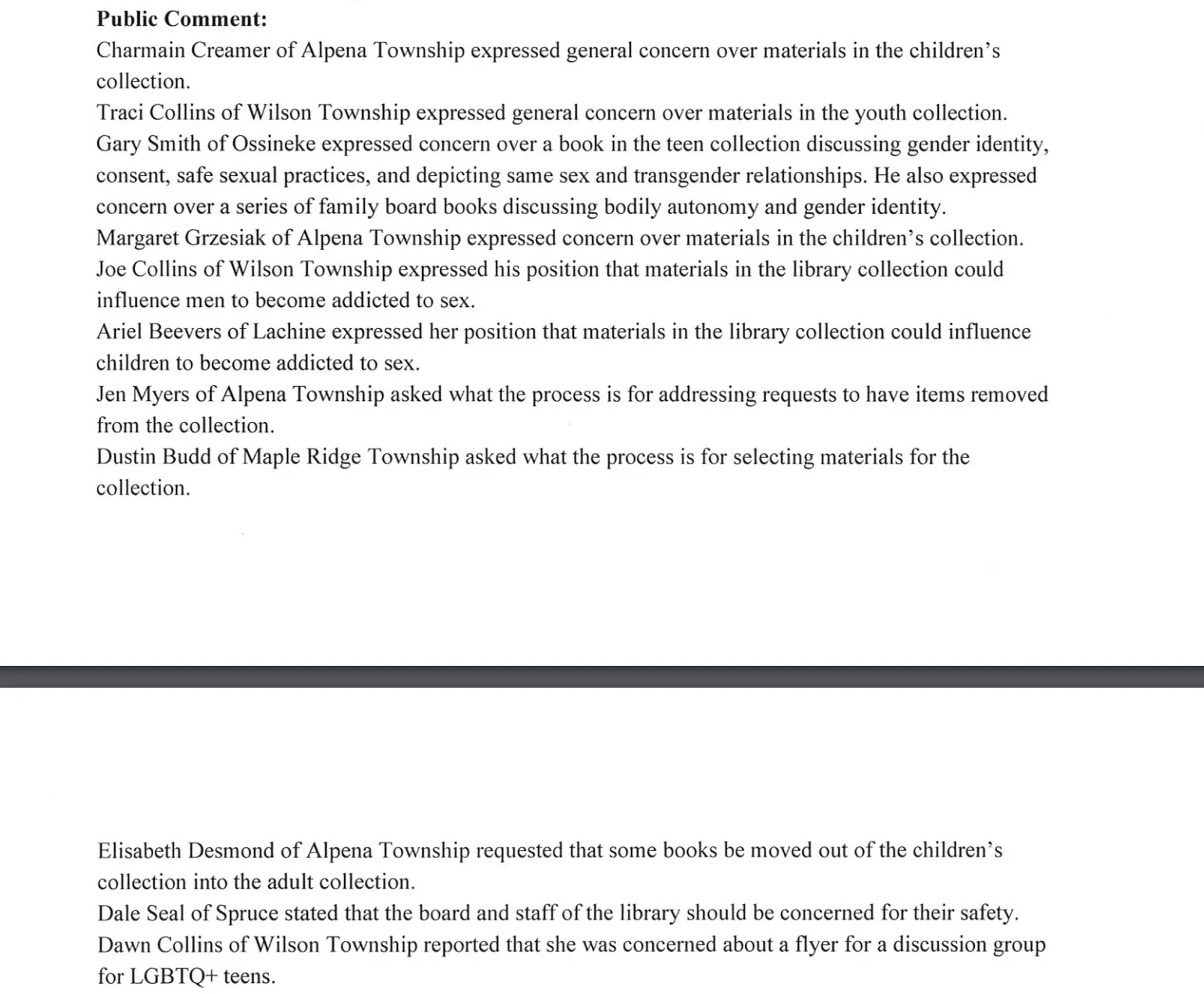
The above public comment list comes from the library’s November 2022 board minutes. Some of the names will become relevant again, particularly Dustin Budd, who questioned how materials are selected for the library. Budd would be appointed to sit on that very library board just one month later, in December 2022.
Alpena Public Library also embarked on a search for a new director in fall 2022. Although the board interviewed several candidates for the position in November and December, they ultimately decided to repost the position with an updated salary.
After that fiery public comment session in November and in the midst of the search for Alpena’s new director, things grew quieter. Collins would not return to talk about books she deemed inappropriate until April 2023. Budd, now serving as Vice President of the Board, requested that the topic of inappropriate books in the library be addressed in the next board meeting and that the then-serving head of youth services talk about her selection process for materials and books used in the library’s teen book club.
The board announced their new director hire at the April meeting, and that director would tentatively begin her work in May. She would not actually begin her service until June, and at her first board meeting as director, Debra Greenacre named the four priorities she had for the first three months of her role as director: updating library policies, building rapport with the staff, the library’s upcoming millage campaign, and establishing committees for the board.
Book complaints and discussions of where and how books were selected for the teen collection and book club were not addressed in either the May or June meetings. Indeed, no public comments were made at either meeting.
*
One month into her directorship, Greenacre was tasked at the July board meeting with pursuing the library’s millage renewal for the February 2024 election. Board members were not sure whether there was enough time for this to happen, but by August, draft language about the public measure was being discussed among Greenacre, her staff, and the library board.
Although there were no public comments at the July meeting regarding inappropriate books, the head of youth services discussed how she selected titles for the collection at this meeting, pre Budd’s request in April.
Between addressing concerns from the previous challenges and the instillation of a library director, the stage was prime for public comments to amp up again, and indeed, they did. At the August board meeting, Collins complained once again about the language and content of those same books and emphasized that the library needed to buy more books and, specifically, more books without profanity or sexual content. Greenacre updated the board to let them know she reached out to a law firm to go over the language for their millage initiative and laid out a timeline for when she anticipated hearing back and submitting the proposal to the county.
The plan to get the measure on the February ballot was dead by September. Instead, the measure would be put on the ballot in August 2024. This would give everyone more time to prepare and get the word out, and Greenacre presented the board with several options for the language they would use for the proposal.
At this same September meeting, several public comments addressed the new director’s role at the library. Specifically, they mentioned that the board should trust Greenacre to do her job, and they all expressed concerns about the short timeline needed to get the millage measure on the ballot. She deserved the opportunity to succeed in her new role rather than the board pushing her to do specific things on a tight timeline. Collins was at that meeting, but she said very little.
*
 Inside the youth area of the Alpena Public Library.
Inside the youth area of the Alpena Public Library.Julie Byrnes requested a meeting with members of the Alpena Library staff in September 2023 to discuss concerns she had with All Boys Aren’t Blue. The oft-challenged memoir by George M. Johnson is a queer coming-of-age tale that has become a favorite among right-wing book-banning groups. Byrnes met with Greenacre and Jessica Luther, assistant director of the library, and she became angry that her demands to relocate the book were not being met. She then provided a formal request to remove the book. The staff took Byrnes’s concerns seriously but made the decision not to remove the book from the collection, which only further infuriated Byrnes. At this point, Byrnes represented herself as the challenger; when she formally requested an appeal of the decision by the staff not to ban All Boys Aren’t Blue in December, she stated that her request was on behalf of Save The Alpena Children (STAC).
Collins and her contingent were not part of STAC despite similar inquiries and complaints. These were two different groups complaining about a small number of LGBTQ+ books in the library.
That same month, the head of youth services left her role at the library.
At the October board meeting, library board president Joseph Garber recommended that Greenacre and Luther coordinate with their regional library cooperative to provide the board with short training about materials challenges. Specifically, the training would cover the rights of board members regarding challenges. While Collins did not share public comment at the meeting, she was back in November asking when the collection development and public comment policies had been approved. Byrnes did not make public comment at the October or November board meetings.
November’s board meeting ended with a short session for trustees on their role regarding book challenges and reconsideration requests. Immediately before that, Greenacre shared the current trustee bylaws with board members and the state trustee manual by which members swore to serve when appointed to their roles. It was becoming increasingly clear that at least one individual on the board was not interested in following the oath of office by which they were to serve, and that would have a direct impact on what was to come in terms of ongoing challenges to library materials.
Collins was back once again in December. She spoke during public comments, wondering aloud
how the board would protect children from materials she felt were inappropriate for them.
Without question, the seeds to upend the library and undermine the professional experience and knowledge of Alpena Public Library staff were planted from the moment a new director was installed. Two different groups were digging their claws in to do battle for the entire next year–and with a county commission eager to distract from their own budget woes, the target on the library’s back would only grow bigger.
*
Greenacre presented an updated collection management policy in January 2024, which is available in the board packet. Collins, alongside Mark Hunter, was vocal following the proposed policy. Collins demanded to know how many times someone had to complain about a book before it was moved, while Hunter mentioned that limiting the number of times an individual can challenge a book may infringe on their right to petition. (Hunter had been a member of the Alpena Public Library board during 2022 and 2023, but he tendered his resignation in December 2023. Leaving the board allowed him more opportunity to be vocal about the library in public comment).
By February, the entire section on Intellectual Freedom in the proposed new collection development policy had been axed–a concern that the library’s former head of youth services addressed during public comment. She thought this left the door wide open to the board moving or banning books in the collection. Indeed, several familiar faces showed up for public comment in February. This included Julie Byrnes, the original challenger to All Boys Aren’t Blue. She informed the board that on behalf of Save The Alpena Children, she would be formally appealing the decision to keep the book in the teen area.
The public comment from that meeting included several community members complaining that “youngsters” should not have access to books like Johnson’s in the public library. Collins–again, not part of STAC but a different group targeting the library–noted that her goal was not to ban the book but to ensure that books like this were not accessible to young people in the library. Hunter was in attendance again, this time demeaning the entirety of LGBTQ+ people in one single public comment statement. Again, Hunter had served on the library board until December 2023.
Plenty of public comments supported the library, including the League of Women Voters, which reminded everyone that the First Amendment allows access to a wide array of books in the public library.
March’s meeting proceeded similarly, with plenty of familiar faces speaking at public comment against “inappropriate” and “pornographic” books in the library. A former doctor of Osteopathic Medicine, Dr. Donald Spaeth, then presented the board with a folder of petitions demanding age-appropriate standards for books in the library and demanding that citizens have the right to determine what those standards are for the library. Several similar comments about “age-appropriateness” followed, including several that noted the library “could be” defunded if they don’t listen to these demands.
Following public comment, Trustee Dustin Budd then brought up his concerns over the still-being-updated collection policy. Those concerns were references to the American Library Association (ALA) and the Library Bill of Rights. The ALA, of course, had been a point of contention among book banners nationwide for over a year. Budd became a target of a petition himself that month for sympathizing with the challengers on moving All Boys Aren’t Blue from the teen to the adult section of the library–he knew via the oath he took to become trustee, as well as through training sessions brought to the board over the rights the board has when it comes to their power in collection decisions that he did not have the power to make such unilateral decisions. That did not matter.
As this meeting closed, board president Garber noted that a decision on the location of Johnson’s book would come in April–he also emphasized that if millage was not passed, the library would face the reality of shutting down at the end of 2024.
This is when the petition helmed by Shoreline church and initially presented at the meeting began to circulate in earnest.
*
It’s certainly tiresome at this point to read through rehashed board meeting minutes, but they serve an important purpose. They establish timelines and characters. They reiterate the reality that few, if any, of these library attacks are happening privately or behind closed doors but instead on public record. They also surface information that might be easy to miss, such as a comment at a special board meeting held on April 3, 2024.
At the meeting, the board talked about the ballot measure for their millage renewal, but Dustin Budd once again brought up the issue of the book challenge at the library. He wanted to know why the board’s regular meeting that month on the 17 would include a presentation from Clare Membiela, a law consultant from the State Law Library of Michigan. He was informed that Membiela would be there to help educate the board on the applicable laws during their conversation about the future placement of All Boys Aren’t Blue. It was yet another training meant to help the board recognize the limits of their roles.
The board approved language for millage renewal at the second special meeting in April. Voters would vote yes or no on renewal, which would keep the library budget as-is. This differed from initial iterations and discussions about the millage, where the plan had been to seek renewal and a new rate to increase the budget. It would be far more realistic to pass a renewal than it would an increase. As it stood, the county, facing a significant budget downfall, was already putting a potential property tax increase on the ballot for August, too.
Then came the regular April board meeting. It is of little surprise that the meeting was another smattering of disinformation about the American Library Association, Marxism in the library, and the damage books like All Boys Aren’t Blue might cause young readers. Byrnes noted that age ratings provided by publishers weren’t enough to determine where a book belonged in a library, and if so, there was no actual need for library workers.
Trustee Budd also took the time to share that when he pledged an oath as library trustee, it was not to either the American Library Association or the Michigan Library Association–two organizations that no one had stated he needed to pledge an oath two. It was yet another means of distracting from the fact he was disinterested in following the policies, procedures, and laws that dictate the limits of library trustee power. He did this before the short presentation by the state library law consultant, emphasizing that library trustees needed to clear any decisions to relocate or remove materials with their own legal teams because they could find themselves breaking the law. She provided every trustee with a handout about the law as it applies to public libraries, accessible in the meeting minutes.
The board then announced they received a formal appeal to the January decision not to move Johnson’s book from the teen collection to adult. The board decided the best course of action would be to hold a meeting with the individual (Byrnes) and the group she represented (STAC) about the book, where Greenacre and two board members would be present.
The appeal was denied at the May 2024 board meeting. Even Budd, sympathetic to those demanding the relocation of Johnson’s book, changed his tune, noting that the board would be in a legally precarious position if they moved the book. In conjunction with Greenacre, the board would use this experience to strengthen the language in their ongoing work to update the collection development policy.
Public comment was what you might expect here, including an interesting take from Collins about how trauma increases instances of ADHD and how important prevention is.
*
By this point, both members of the Save the Alpena Children group and the church group who filed the March petition against 14 LGBTQ+ books in the library were well aware that they could fight the library’s inclusive collection by going for its budget. They’d been at the board meetings and saw the process through the start of Greenacre’s tenure as director.
Alpena Public Library needed its August millage renewal to pass. Three-quarters of the library’s budget came from its mileage. The passage of renewal was pivotal. Board member Joseph Gardner made this clear at the end of the March meeting–even if the millage did not pass, the board would still need to pay off bills, which would jeopardize the entire library.
The church-anchored petition, which continued to gain circulation in the wake of the book relocation denial in May, served as a threat. If you don’t listen to what our group demands regarding these books in the library, then we’ll make sure you don’t have the ability to open your doors again. This wasn’t implied. It was blatant.
Another revision of the collection policy was drafted at the June board meeting. Budd, seconded by two other board members, approved it for Greenacre’s review and legal review. As you might recall, Budd advocated for “age-appropriate standards,” which was the focus of the latest policy revision.
What the policy actually proposed was a ratings system.
The system, included in the June board packet here, would “help” parents navigate the collection’s materials. Budd noted that it was inspired by a rating system from ComicsPlus, a library vendor of digital comics and other materials.
Recognizing parental autonomy, this ratings system might be helpful as parents navigate what is appropriate for their children. This system may be applied to any challenged book, and books may be labeled using a color system, stickers, posters in the children’s section, etc.
– from the Alpena Public Library June 2024 Board Meeting Packet
Absent from this review system? Who would be responsible for such labeling, and who would make determinations about those books.
Every book already has an age range attached to it, and it has been said repeatedly that library workers use their experience working with vendors, books, and their communities to acquire appropriate materials. There is no such thing as pornography nor obscenity in public libraries anywhere, as such items are not produced by publishers with whom the library would work. Books don’t just appear on library shelves. Such a rating system would be duplicative of age ranges already on books, putting the library in a precarious space of liability. If a book that one labels as rated 1 is deemed inappropriate by the same people currently challenging the library’s every decision and the library’s professional expertise, then who gets the blame for not “appropriately” labeling it a 2 instead?
*
The battle over where to put a handful of LGBTQ+ books did not start or end in the library board room. It also took place at the County Commissioner meetings.
The County Commissioners in Alpena, who had been sympathetic to the petitioners, retained the power to appoint the trustees to the library board. Library board members were put in a position to do the job they were appointed to do–represent the needs of the entire community–or do the job the County Commissioners told them to do to keep their positions.
Resentment toward the library began bubbling up at County Commissioner meetings as early as Fall 2022, the same time period when book complaints started at library board meetings. Things amplified after Budd was appointed to the library board, and many saw his appointment as a means for the Commissioners to have one of their own in power. Tensions between the County Commissioners and the library amplified in the summer of 2024 following a presentation by the library about where and how they make collection decisions.**
County Commissioners called the books obscene and put significant pressure on the board to move them. If the library didn’t want to move those books to the adult section–one of the themes made in public comments was how it made no sense to move books published for teens into the adult collection–the Commissioners suggested putting the books in the adult checkout desk for people to ask to borrow.
The battle was also heating up on the streets of Alpena, where those seeking to relocate 14 books were now actively pursuing an anti-millage campaign. This campaign claimed that the library was grooming children and, as such, they should be denied their millage–even and especially if it meant the closure of the library. Yard signs asked residents to vote no on grooming, as did a mass campaign across social media.
The books weren’t moved, so the group was sticking to its promise to ensure the library wouldn’t see funding again.
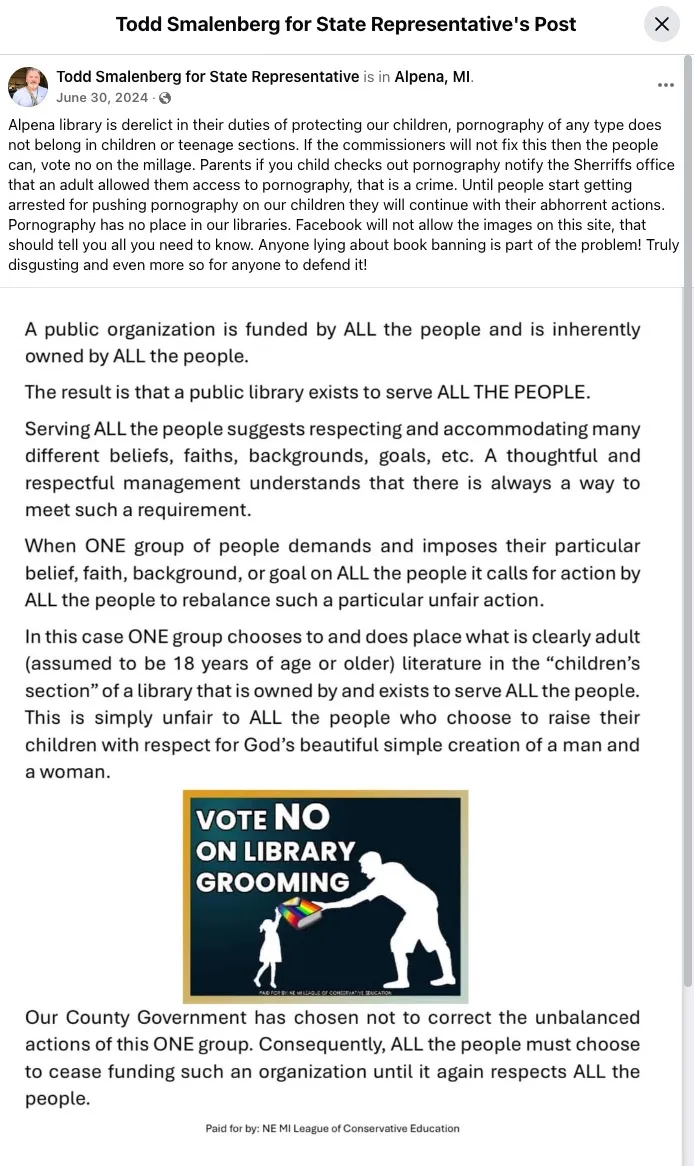
*
“The library has been given space to “repent”. But they have refused to do so. The timing is perfect as we are being given an opportunity to affect quick change by removing their funding. God is handing us a gift! If the community wishes to have control over the library and the content which is exposed to our children, we must make the simple choice.”
– From this blog post about the Alpena Public Library
A story in the Northeast Michigan League of Conservative Education in mid-July laid out the need for voters to defund the Alpena Public Library. Among the reasons listed were the 14 so-called inappropriate books, all linked to reviews from Moms For Liberty’s BookLooks website. The group’s goals were, as its name suggests, pushing for conservative education, and among its aims were greater growth of charter schools and home schools throughout the state of Michigan. While Alpena Public Library was not an educational institution of the likes the groups usually focused on, their misinformation campaign would work to spread awareness among their members and beyond who bought into those beliefs. Many of the individuals who had been showing up to complain about books and age-appropriate guidelines at library meetings were members of this very group. These individuals were affiliated with STAC.
The small group pushing to relocate books and defund the library was only getting louder and utilizing more resources. It wasn’t about banning books as they continued to claim.
It was about ending the library altogether.
Just over a year into her work as director, Greenacre resigned in July. She cited personal reasons for the decision, though there’s little question about the pressure she felt, the names she was called, and the stress under which she was being put by the library board and county commissioners, which also helped in the decision.
Following her resignation, library board president Joe Garber expressed optimism about the library’s millage passing in the upcoming election. He, as well as the rest of the board, elected at the July meeting to begin the search for their new director, and in the meantime, they would appoint Jessica Luther–long-time assistant director–to serve as interim. Every board member was in support except for Budd.
The newly proposed collection management policy went through legal review, and the board had yet to review the feedback. Luther noted at the time that the library’s youth section was going to be reorganized, moving away from a Dewey Decimal-based finding system to one that was more amenable to browsing (this is not unusual, especially in youth departments). Part of the hope was that it would help adults who were worried about children stumbling across books that made them, the adults, uncomfortable. Books about puberty, for example, would be clearly labeled and shelved together.
One day later, the County Commissioners met and voted to remove the current board of library trustees. They had talked previously about doing something like this, since the library did not follow their orders to relocate the books, but it actually happening was uncertain.
Joe Collins, pastor of Shoreline Church and proud petitioner, led the County Commission in an opening prayer before the meeting where the Commissioners fired the library board. He asks for guidance in truth and in guidance for being the best caring place they can be.***
The very first speaker, Dennis Schultz, then asked the County Commissioners to dissolve the library board and replace it with people who have been showing up to monthly commissioner meetings to complain about the library’s lack of book relocation so that the community healing could begin. He added that if the Commission does what he asks, he’d personally ask every single person who had put the signs out advocating for defunding the library to remove them.
The Commissioners then moved to disband the board. The vote was 6-1 in favor of firing the board in retaliation for not removing the 14 books. The Mayor did not agree with the Commissioners.
Despite the vote, the board couldn’t be disbanded immediately. It would need to go before the personnel committee of the County Commissioners, with a timeframe of 60-90 days to make a final decision.
The decision to renew and expand the library’s millage rate came just two weeks before the election, which shocked the board and library workers.
*
Two weeks later, Alpena Public Library won their millage, with nearly 60% of voters approving it.
They would keep their doors open.
The County Commissioners, however, lost their bid for an increase in taxes to support the county budget. This loss further fueled Commissioner animosity toward the library.
*
Back to the library itself.
The lawyer who reviewed the library’s proposed Age Appropriate Guidelines and Ratings System advised the board not to implement it in July, but the board did not review the suggestions until August. There are no rating systems for books, and choosing to implement something like this would open them up to a lot of questions. This news came at a special library board meeting held in mid-August, and board members were advised to review the lawyer’s comments prior to the regular meeting of the board later that month.
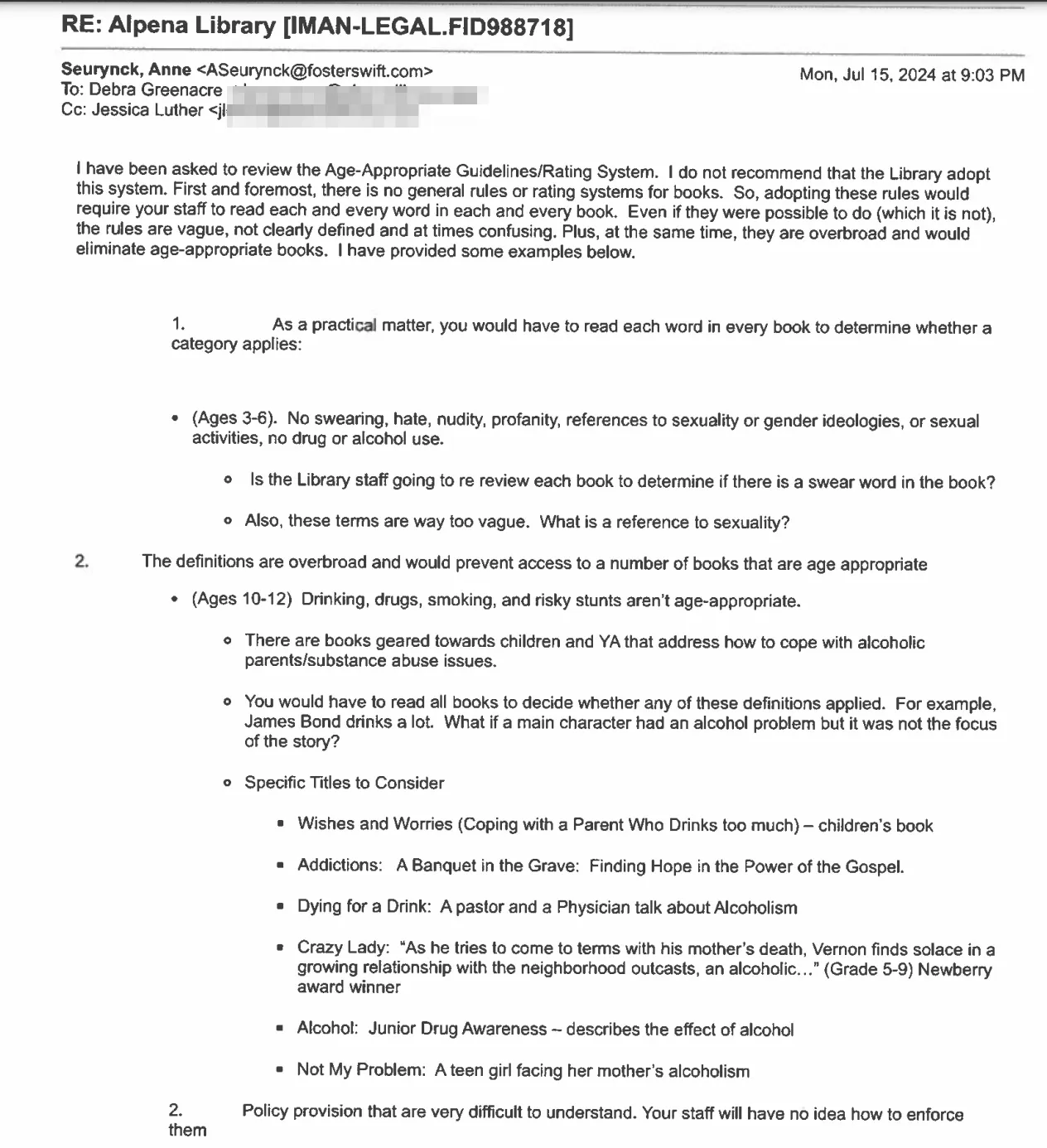
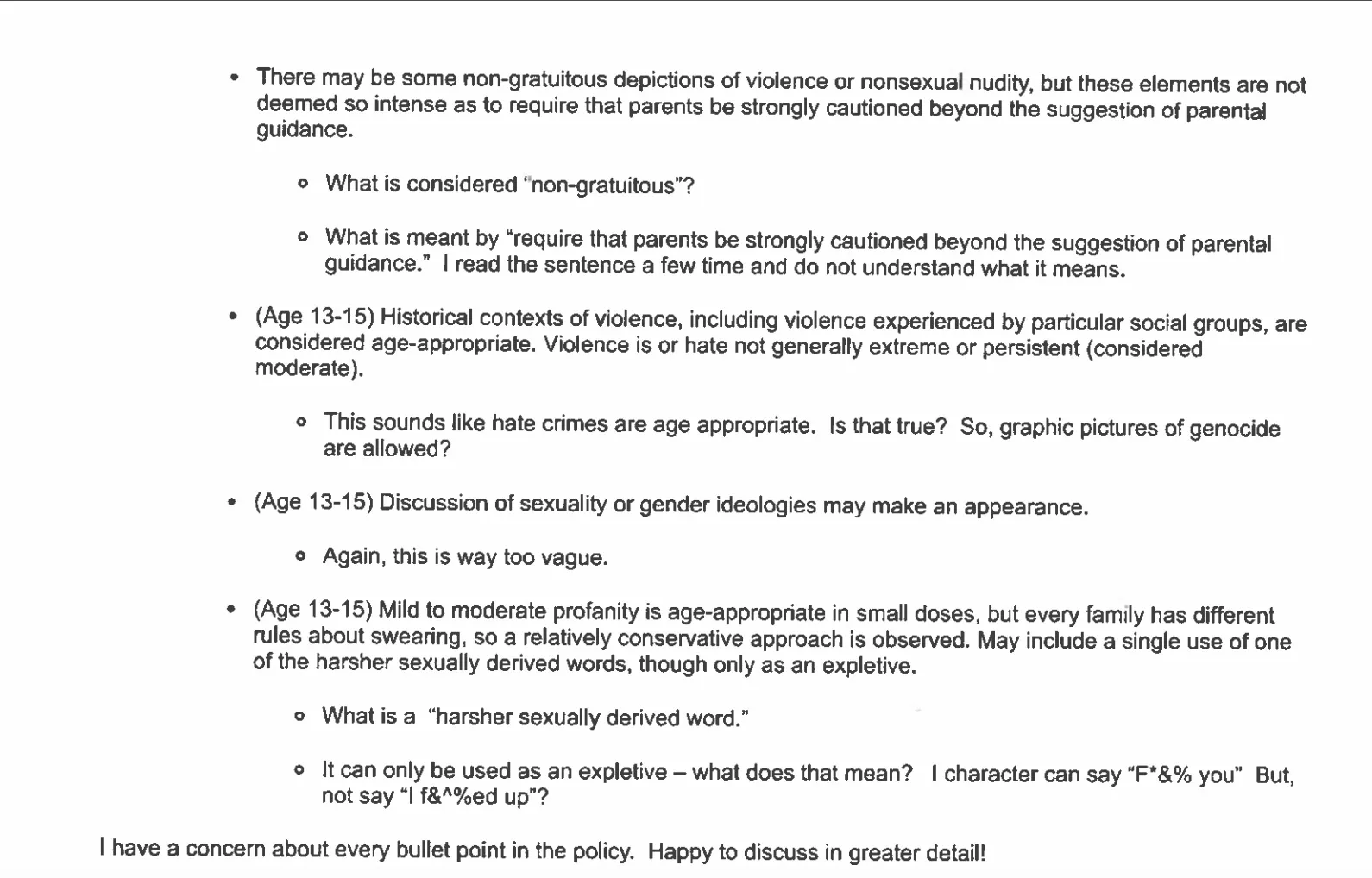
The board moved to pass the updated collections policy without the Age-Appropriate guidelines at the regular August meeting. Everyone was in favor, except for Budd, who had been the proponent of the ratings system since the start.
The youth nonfiction collection at the library had now officially begun to change how it was organized. The goal was not to reshelve anything in the teen, tween, or children’s collections but to instead recategorize them to make it easier to browse within big thematic topics. As reported in the Alpena News, this would serve a secondary benefit for those who had been complaining about children stumbling across books they deemed inappropriate: organization was easier for everyone to understand.
Despite praise for the new plan, at least one County Commissioner still found a way to find fault with the browsing system. Per Alpena News, Commissioner Burt Francisco still worried that a young person could check out the books in question.
“It gives me optimism that maybe we can reach a mutual agreement. I’m a little more at ease, but I’m still concerned about some 12-year-old being able to check these out, but I think we are closer to an agreeable position,” he said, without a hint of indication that it should be the responsibility of parents to parent their 12-year-olds.
Despite the library board members’ uncertainty about whether their terms would end in the next few weeks, book banners were still energized. The library’s millage had passed, and even though this was thanks in (small) part to Schultz’s promise to ensure a good outcome if the County Commissioners fired the board, the books were still going to be an issue.
Now, local agitators were taking out advertisements in the local newspaper to attack the library’s interim director, Jessica Luther.
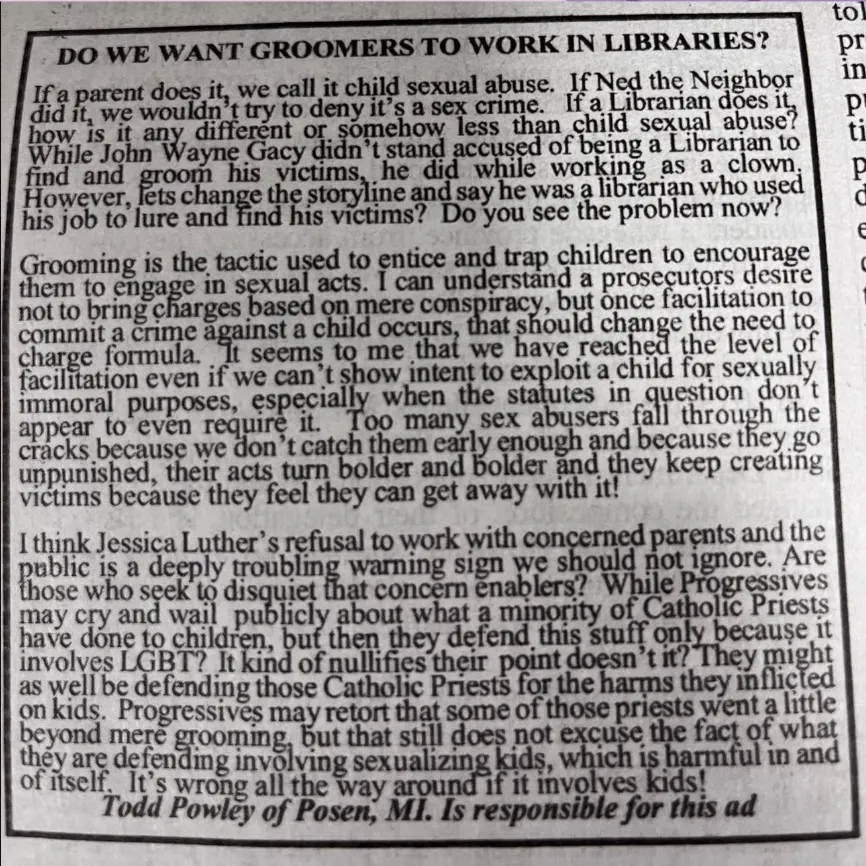
The advertisement, which ran in the Alpena News, is packed with disinformation. It reiterates the same tired talking points dished out at library board meetings for several years—the same talking points shared across the country, too. Powley, however, has no ties to the Alpena Public Library. As a resident of Posen, he does not pay taxes to the institution.
Alpena Public Library’s board website has no minutes posted for September, though they appear in the board packets for October. September was hardly a quiet month in the community. The children’s librarian resigned, and the board was still in the process of determining which search firm they wanted to use to find their next director.
The board went into a closed session one hour into the September meeting. When the session reopened, Jessica Luther had stepped down from serving as interim director and would resume her previous role as assistant director. The ongoing issues related to the handful of LGBTQ+ books in the collection were significantly impacting her health. Board member Michelle Cornish also resigned from her position in September.
Certainly, advertisements taken out condemning her and her work didn’t help. The Alpena News would report on Luther’s resignation from interim director two weeks later, and they included a message from the board president who complimented Luther on a job well done while acknowledging the unfair position in which she found herself.
*
Then news broke that the County Commissioners changed their minds. The library board would no longer be fired. There was discussion about the new book arrangement being a compromise to relocation demands–several of the so-called inappropriate books were grouped together under the “puberty” section to make it easier for parents to identify–and the Commissioners noted that they would be appointing two new members to the board shortly anyway.
Commission Chair John Kozlowski noted that at that point, he and the board would evaluate candidates much more closely and would appoint people sensitive to concerns about the content of books available in the library.
In retrospect, that comment raised a much larger red flag than expected. At the time, it felt like a win for the library and the library board, which was now trying to fill an interim position while preparing to conduct a nationwide search for its new director.
*
Advertising for the director position had not happened by October, but Budd suggested the library raise the upper limit of the director salary to $90,000 and begin the search in force in January 2025.
The board held no meeting in November, and as of writing, minutes from the December 2024 meeting have yet to be posted. But that doesn’t mean things weren’t brewing. They were–and it was once again County Commissioners stirring the pot.
After trustee Cornish stepped down from her role on the library board and the unfinished term filled by trustee Lauren Mantlo was coming to a close, the County Commissioners now had the opportunity to do precisely what was alluded to. They could appoint two trustees for those roles and put candidates through an interview process to ensure that those appointed would serve the goals of the Commission and, by extension, those seeking to relocate books and seek “age-appropriate” guidelines in the library.
The very same people pushing the narrative about librarians being groomers now had the opportunity to have a bigger say in what the public library would look like.
Mentlo is the director of a local community college library and has her library degree. She was the ideal candidate to sit on the board to finish up a term, and in seeking a reappointment, her experience and background would seem perfect. Except that for the County Commission, her knowledge and experience in librarianship was not an asset but a liability. Once Mentlo met with the Commissioners during their round of interviews for the two trustee seats, she received an email from the Commission later that afternoon informing her she would not be considered for reappointment. Her time on the board was done.
The two new trustees appointed by the Commission?
Long-time book challengers and public comment speakers Traci Collins, major force behind the March 2024 petitions, and Julie Brynes, spokesperson for Save The Alpena Children and filer of the original challenges of All Boys Aren’t Blue.
Two of the most aggressive, anti-library candidates in a pool of 12 who interviewed for the appointments were given the power. With their appointments, the balance of power in the library board shifted to one that undoubtedly serves the Commissioners and those involved in the initial petition, the local far-right church groups, and Save The Alpena Children.
*
We want easy answers, and we want the issues at hand to be ones we can easily comprehend. But the reality is we’re living in complex times with insidious means of acquiring and upholding power happening all around us.
Public libraries have been under attack not only for the books that are on shelves but they’ve been under attack for several years by far-right and Christian nationalist agendas. What looks like a simple complaint over a book is something much darker: it’s a push to have total control over one of the few sources of public good and democracy in the country.
We don’t know what will happen yet with Collins and Byrnes on the board, but we can make plenty of speculations. The library will remain open as is for a while, given that the millage passed. But these two will, without doubt, be excited to have the opportunity to rewrite the policies that have not yet been finalized, and they’ll have a significant say in the kind of leader who will be given the title of director. While the best candidate in any job search should walk away with the role, the reality is a board stacked in favor of book censorship will find plenty of ways to reject candidates who don’t want to be their puppet.
Alpena County Commissioners attempted a second ballot initiative to save their 2025 budget in late November 2024, but it, too, failed. The Commissioners have shown they’re not afraid to use the library as a pawn in their games of power. Now, with the reality of a host of cuts to come to city services, things may take an even harsher turn, especially because the library’s budget and operations are secure–and publicly supported–for the foreseeable future.
All it takes is a few connections and a few favors to turn an institution belonging to all taxpayers into a space paid for and operated by those with a specific, hateful agenda. The library won’t go away, but the library may also never again belong to the whole of a community.
If there’s one thing that’s clear from Save The Alpena Children and its affiliates at Northeast Michigan League of Conservative Education at least, it’s that the work to “relocate” books deemed “inappropriate” won’t stop at children’s books. They’ve got plenty of adult nonfiction books they believe are explicit and should not be available to anyone.
Reports from Alpena citizens have mentioned that STAC has also begun to make their way into the public school, focusing again on LGBTQ+ materials. What begins in the schools moves to the public libraries in most states. In Michigan, however, it’s been common to see the reverse: what begins in the public libraries then moves into the public schools.
Alpena’s library joins those like York County Public Library (SC), and so many others where the “public” part of the library’s name does not serve said public. It’s become a place for specific, narrow ideologies and beliefs to find a place to land and to grow.
—-
*At Samuels Public Library, the fight continues. Despite the small contingent of churchgoers’ failure to defund and close the library, their efforts helped create a new body of oversight for the library at the county level, giving their demands an unprecedented voice in how the public library shall operate for the entire county.
**You can watch the August meeting here, beginning at minute 56. Alpena County Commissioners utilize Board Book to organize their meeting minutes and agendas–in theory. As of writing, not a single link to their approved minutes exists for the meetings listed and information in the listed projectors is incomplete. To know what transpired at County Commissioner meetings, one must hope that recordings of those meetings are available to view on YouTube.
***Public prayer opening a municipal government board meeting violates the Establishment Clause in and of itself.



















 English (US) ·
English (US) ·